
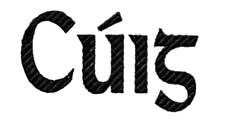

The Central Bank of Ireland Archive was opened to public access in 2017, and has provided new source material on the designs of Irish banknotes. Some of the content of this article draws on information from the archive, referenced as CBIAR in the text.
The theme of the Catherine McAuley five pound note is education and health in 19th century Ireland, and its support by the religious orders. The overall theme of Series C banknotes is that of important Irish historical people of the 19th and early 20th centuries in Ireland, the era of the formation of modern Ireland.
The new series of notes also retained a deliberate Irish flavour to their design, established by the Series B banknotes.
The Catherine McAuley Five Pound note was launched on 15 April 1994 [2.], and entered circulation on 18 April 1994, one month after its date of issue.
It was the second denomination of the new Series C banknotes to enter circulation.
The banknote was designed by Irish artist Robert Ballagh [3.].
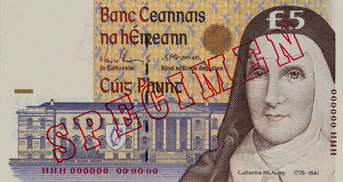
![]()
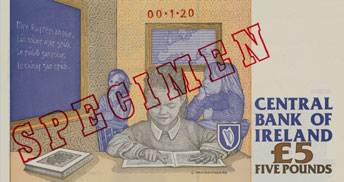
On the face, is the text in Irish 'Banc Ceannais na h-Éireann' (Central Bank of Ireland) 'Nóta dlíthairgthe cúig phunt' (Legal tender note one pound). In the unprinted field below the watermark are the titles of the signatories, in Irish: 'an gobharnóir' (governor) and 'rúnaí na roinne airgeadais' (secretary of the department of finance).
The portrait of Catherine McAuley (1771-1811) [4.] fills the right hand side of the ne Irish 5 pound note.
Catherine McAuley founded the Sisters of Mercy, an order of Irish nuns. She used an inheritance to build a house in Dublin and dedicated herself to shelter homeless women, help the sick and dying and to educate poor girls [5.]. The portrait on the banknote is based on a posthumous portrait of McAuley. In the background is one of dublin's major hospitals, the Mater Misericordiae Hospital [6.], which was opened by the sisters of Mercy in 1861.
The latent image security feature, which shows the letters 'IR' when tilted to the light is printed as a brown roundrel to the left of the portrait on the face of the note. Microprinting of 'BANCCEANNAISNAHEIREANN' repeated surrounds this latent image security feature.
The building in the centre of the face of the Catherine McAuley Five Pound note is the Mater Misericordiae Hospital in Dublin.
A modern classroom is featured on the reverse. Hanging on the wall is a map of Europe without country borders.
On the blackboard is written the first verse of the Irish poem 'Mise Raifteri an File', written in 'old Irish' Celtic script. The version of the poem here is based on that in 'Songs Ascribed to Raftery' by Douglas Hyde, which was published in 1903.
Below, the poem as written on the blackboard, followed by a translation into English.
Mise Raifteirí an file,
Lán dóchas is grá,
Le súile gan solas,
Le ciúnas gan chrá.
I am Raifteirí the poet,
Full of trust [hope] and love,
With eyes without light,
With silence [gentleness] without torment [misery]
The Catherine McAuley Irish five pound note was much smaller than the Series B Scotus five pound note which it replaced in circulation.
Dimensions of Irish pound notes tended to vary by a millimetre or so. The dimensions below are from measurements of actual notes.
Series B, Scotus 5 Pound Note, 156 x 82 mm.
Series B, Catherine McAuley 5 Pound Note, 120 x 64s mm.
Below, illustrated is the final date of Series B Irish 5 pound note along with the first date of Series C Irish 5 pound notes.
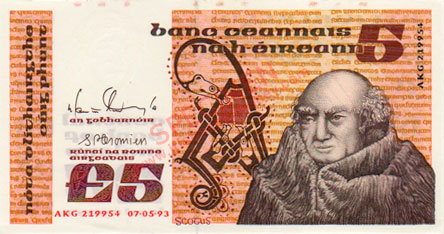
![]()
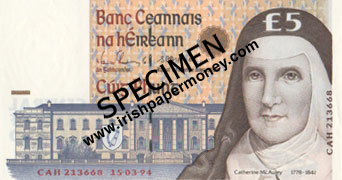
The 'Five Punt', Catherine McAuley was a very common denomination, and examples of the note final date of issue 00,00,99 are easy to obtain in true UNC grade (67-69 with quality mark).
Several unopened blocks are known to have been kept by dealers shortly before the introduction of the Euro in 2002.
Predominantly brown and yellow on the face and reverse.
Metallic Thread: A stardust security thread runs vertically through the left of the note, which is embedded in the paper and breaks the surface at regular intervals. This is a common security feature used in banknote production
On the Series C five pound note the denomination in words '£5' is repeated along the length of the security thread.
Certain areas of the Series C £5 note fluoresce under a UV light source.
There is a UV active area on the central left area of the face of the note, and both serial numbers fluoresce prominently when exposed to UV light.
The Catherine McAuley Five Pound note circulated for 8 years.
It was withdrawn from circulation in 2002, to be replaced by the EU common currency, Euro, of which Ireland was a founding member state.
The final date of the McAuley 5 Pound note is 15.10.99.

E153. Type 20: Signatures: Maurice Doyle, S. P. Cromien. 4 Dates, 2 replacements. 15.03.94-28.04.94.
E154. Type 21: Signatures: Muiris S. Ó Conaill, P. Mullarkey. 7 Dates, 2 replacements. 21.12.94-14.02.97.
E155. Type 22: Signatures: Muiris S. Ó Conaill, P. Mullarkey. Serial prefixing system altered. 3 Dates, 2 replacements. 19.08.98-15.10.99.
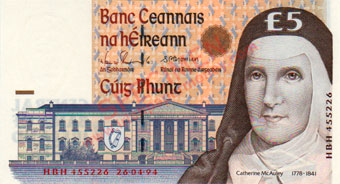
![]()
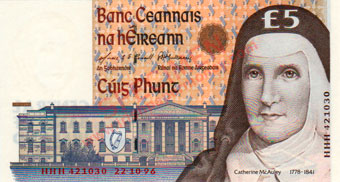
The two signature varieties of the Catherine McAuley Series C Five Pound notes
There were 14 dates of issue for the Series C £5 note. The first date of issue was 15.03.94, and the final date was 15.10.99.
Catherine McAuley five pound notes are very common, and it is straightforward to collect all the dates of issue in circulated condition at little expense.
An image of each of the 14 dates of issue can be viewed on the Series C View by Dates page.
Six dates of the McAuley £5 note were printed as replacement notes, four with HHH prefix, and two with MMM prefix.
References [Last retrieved 04.08.24]
1. Central Bank of Ireland Archives, Dublin. Referred to as CBIAR in the text. [Accessed 24 May 2018].
2. Series C £5 Pound note launch. <https://www.rte.ie/archives/2014/0415/608794-new-5-note-for-ireland-1994/>
3. Robert Ballagh, designer of the Series C banknotes. http://www.robertballagh.com/
4. Catherine McAuley. <https://www.dib.ie/biography/mcauley-mcgauley-catherine-elizabeth-a5554>
5. Sisters of Mercy. <https://www.mercyworld.org/catherine/>
6. Mater Misericordiae Hospital <https://www.mater.ie/about/about-the-mater/>
Low Number Irish Banknotes
Irish Joint Stock Banks of Note Issue from 1783
Irish Legal Tender Note Specimens
Ploughman Scan Survey (PSS)
1 Pound Ploughman
5 Pounds Ploughman
10 Pounds Ploughman
20 Pounds Ploughman
50 Pounds Ploughman
100 Pounds Ploughman
Irish Ten Shilling Notes
1 Pound Note Lady Lavery
5 Pounds Lady Lavery
10 Pounds Lady Lavery
20 Pounds Lady Lavery
50 Pounds Lady Lavery
100 Pounds Lady Lavery
1 Pound Note, Queen Medb
5 Pound Note, John Scotus Eriugena
10 Pound Note, Jonathan Swift
20 Pound Note, W. B. Yeats
50 Pound Note, Turlough O'Carolan
100 Pound Note, Grace O'Malley
5 Pound Note, Sister Catherine McAuley
10 Pound Note, James Joyce
20 Pound Note, Daniel O'Connell
50 Pound Note, Douglas Hyde
100 Pound Note, Charles Stewart Parnell
Northen Ireland Polymer notes
Bank of Ireland Polymer Notes
Danske Bank Polymer Notes
Ulster Bank Polymer Notes
Special Sections and Articles
The Transition of Irish Currency, Irish banknotes 1918–1928
The Partition of Irish Currency, Irish banknotes 1928–1930
Banknote Design Evolution 1824 to 1916
Irish Three Pound Notes
Contemporary Forgeries of Early Irish Banknotes, ca1800-1930
Limerick Soviet Notes
Irish World War 2 Banknote Issues
Low Number Irish Banknotes
Irish Joint Stock Banks of Note Issue from 1783
Irish Legal Tender Note Specimens
Ploughman Scan Survey (PSS)
![]() Stable version. Last update 24.08.24.
Stable version. Last update 24.08.24.